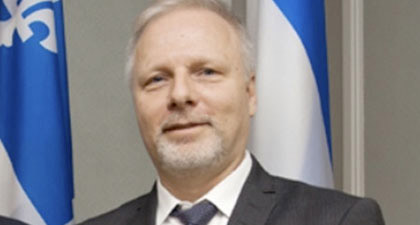MONTREAL — After a week of widespread criticism and a demonstration by thousands in the streets of Montreal, the Parti Québécois government is indicating that its proposed charter of Quebec values is not written in stone.
On Sept. 17, International Relations Minister Jean-François Lisée said at a news conference that the government is open to modifying the plan before tabling a bill to the National Assembly.
Lisée, who is also responsible for Montreal and anglophones, said input from the public will be taken into account.
“We’re looking for ways to improve the proposal,” he said. “We’re listening…We’re asking people to participate and we’ll take these [opinions] into consideration.”
However, Lisée defended the proposed charter as “modern and progressive” and the banning of religious symbols in the public service as necessary.
“We support religious freedom. The debate we’re having is about the neutrality of the state—nothing else.”
The charter would ban on “overt and conspicuous” religious attire and would apply to all employees of ministries and government organizations, provincial and municipal; judges, police officers, prosecutors and correctional agents; staff of the Centres de la petite enfance (CPEs) and subsidized private daycares, public school boards, cegep and universities, and public health care and social services.
Cegeps, universities, health and social service institutions, and municipalities could opt out of the charter for a renewable five-year period.
The five-pronged plan also calls for amending the Quebec rights charter to include rules on handling religious accommodation requests in light of the supremacy of state neutrality and gender equality, forbidding public employees from promoting their religious beliefs on the job, requiring that faces be uncovered to receive government services, and having all ministries and governmental organizations implement a policy on neutrality and the management of religious accommodation.
Meanwhile, the Centre for Israel and Jewish Affairs (CIJA) is asking members of the Jewish community to sign a “Manifesto for an Inclusive Quebec,” a petition opposing the charter.
Drafted by academics and professionals from across the professional spectrum, this non-partisan manifesto “sets out a principled critique” of the government’s plan, which CIJA endorses.
About 19,000 Quebecers have already signed the docucment, which states that the proposed charter “would force minorities to choose between their conscience and their survival… Quebec identity is not built upon the rejection of the other.”
CIJA reiterated its position that the proposed measures are “unreasonable” and “a departure from Quebec’s history of openness and inclusiveness.” It accused the government of failing to fulfil its responsibility to promote “social cohesion.”
The manifesto can be found at http://quebecinclusif.org/manifeste-2/english/.
CIJA also affirmed that it won’t collaborate with the Collectif québécois contre l’islamophobie, the organizer of the big downtown march against the charter held on Sept. 14, Yom Kippur.
“The Jewish community speaks for itself and will not accept to be co-opted or manipulated by the dubious objectives of some of the organizers of the demonstration, who include religious radical fundamentalists with whom the Jewish community will never make common cause,” CIJA said in a statement.
The demonstration’s spokesperson, Adil Charkaoui, was arrested in 2003 on suspicion of being an Al Qaeda agent. He was detained for 21 months under a national security certificate, which was annulled in 2009.
The group, which includes Independent Jewish Voices, a group critical of Israel, has said it plans other actions against the proposed charter.
Salman Elmenyawi, president of the Montreal Muslim Council, apologized for the scheduling on Yom Kippur, attributing it to a misunderstanding.
